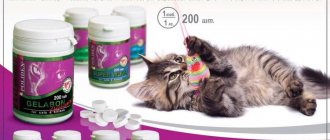Causes of dysbiosis in dogs
It is known that dysbiosis is a symptom. However, a frivolous attitude towards this problem for many years has led to the emergence of a cliché that dysbiosis does not occur in carnivores.
Today, it has been proven that dogs can develop dysbiosis, which negatively affects the condition of the body as a whole.
Statistically, the most common causes of dysbiosis in dogs are:
- Incorrect feeding.
- Incorrect or too aggressive treatment.
- Treatment with antibiotics, corticosteroids, non-steroidal anti-inflammatory drugs.
- Dyes and preservatives in food.
- Processed foods, usually grains.
- Parasites.
- Stress.
- Intoxication.
- Vaccination.
Dysbiosis is a disorder in the small intestine that leads to damage to the intestinal lining and microvilli. The main job of these microvilli is to absorb digested nutrients and send them into the bloodstream. When the mucosa and microvilli are damaged, they prevent the transfer of molecules into the bloodstream.
The liver begins to work more actively and secrete more enzymes. This does not have a tangible, positive result, so the immune system is excited. With dysbiosis, the immune system “must neglect” other tasks, such as fighting bacteria and filtering the blood. Ignoring such disorders can lead to the development of autoimmune diseases and a number of other problems.
Is there a “magic pill”?
Probiotic preparations appeared somewhere in the middle of the last century. Then they spread. The drugs demonstrated their remarkable properties in numerous experiments.
This group of drugs had practically no contraindications, and many thought that a magic elixir had been found. I took a pill and forgot about my health problems. But these were only forecasts. In practice, many patients simply wasted their money, and the results were not always pleasing to the patients. Currently, more and more reports have begun to come not about the benefits of the drug, but about its harm to health.
Indications for use
Symptoms of dysbiosis that you observe in your pet periodically or constantly are indications for the use of probiotics:
- Gases.
- Bloating.
- Diarrhea.
- Pain syndrome in the abdominal cavity.
- Wandering pains.
- Bad breath.
- Hyperactivity.
- Bladder infections.
- Weight loss or sudden weight gain.
- Gum diseases.
- Immune system disorders.
It is important to remember that there are several forms of dysbiosis. Depending on the severity of the disease, the dog may experience the following symptoms: allergies, vomiting, chronic fatigue, irritable bowel syndrome.
Instructions for use of probiotics
Instructions for using a specific brand of probiotics are contained in each package. However, in order to have a good understanding of the theory, it is important to understand the general rules.
A wide range of probiotic supplements for dogs includes preparations with different numbers of strains and “bacteria numbers”. The “population” of probiotics is measured in colony-forming units (CFU). The higher this indicator in the composition, the better.
Important! Never use expired probiotics! Since natural probiotics for dogs must contain live, active probiotic strains, the expiration date is the date they die.
Probiotics can be prescribed short-term or long-term, but long-term use is optimal. Choose a probiotic formulated specifically for dogs, with multiple strains and high CFUs (at least 4 billion). When using drugs with more strains, there is a much greater chance that the bacteria will survive and reach the small intestine, where they are most effective.
Note! No significant research has been conducted to determine the optimal dosage of probiotics for dogs.
It is not that simple
There are over 400 types of probiotic bacteria, and they are all different. Some will not bring any benefit to the dog because they are not specific to this biological species, while others, although they have all the necessary beneficial properties, are too vulnerable to environmental factors.
After all, when entering an industrial feed, a probiotic must survive high temperatures, withstand long-term storage and remain strong enough to overcome the final test - passing through the acidic environment of the stomach and ending up in the intestines.
The most common veterinary probiotics for dogs consist of colonies of lacto- and bifidobacteria - these microorganisms are certainly useful for the intestines, but unfortunately they are poorly preserved during heat treatment of raw materials and food storage.
Breed characteristics
Do breed characteristics affect the risk of developing dysbiosis or the absorption of probiotics? There are no scientific answers to these questions, but practice shows that only doses matter.
The dose of probiotics is based on weight, so the size of the dog matters. However, there is no risk of overdosing on probiotics. Bacteria that are superfluous will simply die.
Probiotics for Small Breeds
For small breeds, natural sources of probiotics, such as fermented milk products, are recommended. You can switch your dog to medicated food. Concentrated supplements are used only for severe vitamin deficiency or chronic intestinal pathologies.
For medium and large breeds
For medium and large breeds, it is recommended to take courses of probiotic supplements 2-4 times a year. Fermented milk products will also be useful in the diet. In large dogs, dysbiosis takes longer to develop, but it is also more difficult to eliminate.
Note! To treat dysbiosis in large dogs, 2-3 courses of probiotics are usually necessary.
Gastrointestinal diseases
Microorganisms in the human intestine take up a lot of space. But in terms of mass, they weigh approximately 2-3 kg for an adult. A person of such weight not only has to be given water and food, but often also treated.
Artificial support is also often required for the intestines under conditions of stress, poor nutrition, and a sedentary lifestyle. And so-called probiotics and prebiotics are suitable for this case.
Can dogs be given “human” probiotics?
Many owners doubt whether they can give their dogs “human” probiotics. There are no clear contraindications if the drug is conditionally safe. That is, if you have a supplement left that has no contraindications or side effects, you can safely “feed” it to your dog. Calculate the dosage by weight.
Note! If the instructions indicate dosage for adults and children, you need to remember that “adults” mean people weighing over 60 kg.
It is important to remember that the needs of dogs and people are different. Probiotics designed for humans may not be effective for your pet.
General recommendations
Having studied a fairly large body of scientific literature, we can formulate general recommendations for the use of probiotics. First things first: probiotics are essential for your pets to develop a healthy digestive system and immune system.
The first thing you need to pay attention to when purchasing dry food with probiotics is the number of CFUs. This will help you decide whether you need to purchase additional probiotics or, if you are already giving your pet probiotics in a different form, whether it will be too much.
If the number of CFUs on the package is not written, well, you can either choose another food, or hope that someone in the food remains alive...
1. Effects of probiotic Lactobacillus acidophilus strain DSM13241 in healthy adult dogs. Baillon ML1, Marshall-Jones ZV, Butterwick RF.
Popular Probiotic Brands
Popular brands of probiotics are used throughout veterinary medicine. In almost all cases, probiotics have a positive effect on the body. The reason is that the negative impact on the body (virus, infection, intoxication, etc.) destroys friendly bacteria in the intestines, that is, the dog develops dysbiosis.
Fortiflora
Canine FortiFlora is a probiotic supplement. The drug contains a strain of probiotics SF68, which is characterized by viability.
Indications:
- Disruption of the gastrointestinal tract.
- Changes in the balance of intestinal microflora.
- Diarrhea that develops as a reaction to stress, improper feeding, sudden changes in diet, antibiotic therapy.
- Supplementation of therapy for chronic disorders of the gastrointestinal tract.
- Unstable stool consistency in puppies.
- Increased gas formation.
Contraindications include only specific allergies (intolerance). No side effects were identified. The additive is introduced into the feed once a day. The rich taste allows the supplement to be used to stimulate appetite in weak puppies or dogs that are sick.
Viyo
VIYO Reinforces for adult dogs – oral suspension with probiotics. One of the functions of the supplement is to strengthen the immune system.
VIYO Reinforces contains fructooligosaccharides and inulin. The packaging of sachets (30 ml) is designed for one delivery. For large dogs, the dosage may be increased. The supplement can be used in courses (3-4 times a year). VIYO Reinforces is recommended before and after vaccination.
Akti-Dog
Akti-Dog is a food supplement (powder) with probiotics for medium and large dogs. Additive properties:
- Restoration of intestinal microflora.
- Elimination of chronic diarrhea, constipation, allergic reactions that arise against the background of dysbacteriosis.
- Supports the dog's body during pregnancy.
- It has a beneficial effect on the process of assimilation of nutrients.
- Increases the level of immunity.
- Eliminates negative consequences after antibiotic treatment.
The additive can be added directly to the feed or used to make yoghurt. Yogurt is made from whole milk, according to the instructions. The supplement has no contraindications or side effects.
Baikal
Baikal is a probiotic preparation with complex action. Indications:
- Prevention and treatment of dysbacteriosis, allergies, vitamin deficiency, intoxication, including in case of poisoning.
- Strengthening the immune system.
- Increasing the absorption of nutrients from food.
- Restoration of skin and fur.
- Supporting the body of a pregnant dog.
- Increasing tone in elderly and recovering animals.
- Eliminates unpleasant odor from dog skin and fur.
The drug is available in the form of a solution, which is diluted with water immediately before use. The daily dose is divided into 2-3 doses. The drug has no contraindications or side effects.
Bifidumbacterin
Bifidumbacterin is a drug for humans, a probiotic. Contains live active bifidobacteria. When used in veterinary medicine, the following effects are expected from the drug:
- Restoration of intestinal microflora.
- Increasing the level of the body's immune defense.
- Elimination of pathogenic microflora.
- Maintaining normal functioning of the gastrointestinal tract.
- Elimination of symptoms associated with the body’s natural resistance, including allergies.
The dosage of the drug is calculated by a veterinarian. No side effects were observed when used in veterinary medicine. The drug is used with caution if there is a risk of lactase deficiency.
Vetom
Vetom 1.1 or Vetom 1.1 is a probiotic supplement. The drug is used to treat dysbiosis in poultry, farm and domestic animals. Indications:
- Restoration of microflora.
- Increasing the body's natural resistance.
- To eliminate the consequences of antibiotic treatment.
- Abrupt transition to another type of food.
The dosage is calculated according to the instructions. The drug has no side effects or contraindications.
Zoonorm
Zoonorm is a probiotic supplement in powder form. The additive is used for:
- Additions to therapy in the treatment of infectious diseases.
- Restoration of intestinal microflora, including after antibiotic therapy and chemotherapy.
- Treatment of dysbacteriosis, metabolic disorders, allergic reactions.
- Increasing the level of immune protection.
- Treatment of endometritis.
- Increased body tone during pregnancy, after childbirth or surgery.
- Prevention of acute stress.
- Eliminate digestive disorders.
The additive is administered directly into food or liquid once a day. Dosage is calculated by weight. The course of treatment is 5–7 days. On the recommendation of a veterinarian, the course can be extended. The drug has no side effects or contraindications.
Kanigest
Kanigest is a food supplement with probiotics in the form of a paste. The drug is used for:
- Increasing the body's immune defense.
- Increased immune response after vaccination.
- Ensuring the normal development of the puppy.
- Restoration of intestinal microflora.
- Additions to therapy in the treatment of gastrointestinal pathologies.
Kanigest can be used as an additive to a milk replacer for feeding puppies or kittens from birth.
The drug has no contraindications or age restrictions. When using the drug, in rare cases, animals experience individual intolerance.
Lactobifadol
Lactobifadol is a probiotic supplement. Indications for use:
- Prevention and treatment of dysbiosis in puppies from birth, adults and older dogs.
- Treatment of diarrhea and other gastrointestinal disorders.
- Increased feed digestibility.
- Maintaining the dog's body during pregnancy.
- Maintaining the dog’s body after childbirth and normalizing lactation.
- Restoration of metabolism.
- Supplementation of therapy for pathologies of the gastrointestinal tract, liver, pancreas and genitourinary system.
Important! Lactobifadol must be transported and stored at acceptable temperatures!
Lactobifid
Lactobifid is an additional supplement with probiotics. Expected effects:
- Normalization of intestinal microflora.
- Increasing the body's resistance.
- Improving the functioning of the gastrointestinal tract and feed absorption.
- Supporting body tone.
- Smoothing out negative effects when changing the type of feeding.
- Elimination of digestive and stool disorders.
- Eliminating the negative effects of eating low-quality foods.
- Supporting the dog’s body during estrus, pregnancy and after childbirth.
- Reducing intoxication, including in liver pathologies.
- Support the body after operations, blood loss, burns, etc.
The supplement contains bifidobacteria and lactobacilli. The drug is available in tablet form. Usually, the additive is added directly to the feed. There are no restrictions on use, side effects or contraindications.
Strategies
Lactobacterin is a drug containing natural intestinal microflora.
All groups of probiotics can be divided into two large groups.
The most common probiotics available are those that contain natural intestinal microflora. Among these drugs the following names can be noted:
- "Mutaflor";
- "Colibacterin";
- "Nutrolin";
- "Lactobacill";
- "Biobakton";
- "Lactobacterin";
- "Bifidumbacterin".
These drugs contain either bifidobacteria, or lactobacilli, or colibacteria. This group has been used in medicine for more than 80 years and is quite well studied. The advantages of these drugs:
- Almost complete absence of contraindications;
- Almost complete absence of side effects;
- Mild physiological effect.
Disadvantages of these drugs
It is worth noting that the therapeutic effect of these drugs decreases every year. After all, in order to provide the proper therapeutic effect, such drugs need to undergo a course of settling in the intestines.











